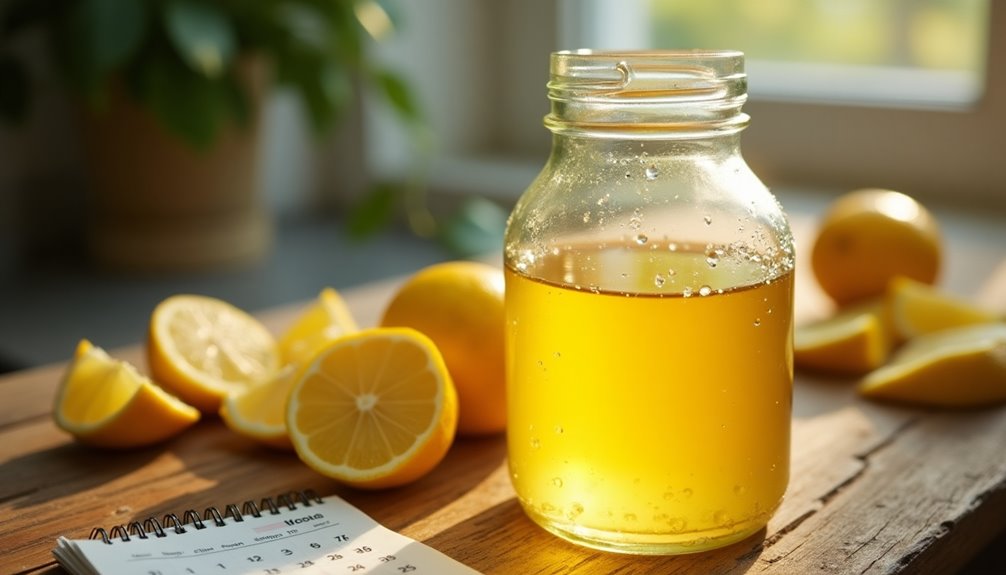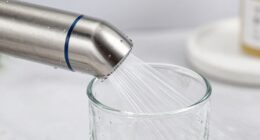Opened lemon juice can last 6 to 12 months in the fridge, thanks to preservatives in bottled varieties. It's perfect for adding flavor to your dishes and drinks. Just make sure to store it properly by sealing it tightly and keeping it away from sunlight. Always check for signs of spoilage, like off odors or changes in color. If you want to know more about the shelf life of different types of lemon juice, keep exploring!
Key Takeaways
- Opened bottled lemon juice lasts 6 to 12 months when refrigerated, thanks to preservatives.
- Freshly squeezed lemon juice is best used within 2 to 3 days for optimal flavor.
- Unopened bottled lemon juice can remain shelf-stable for several months past its expiration date.
- Signs of spoilage include off odors, color changes, and unpleasant taste, indicating it's time to discard.
- Proper storage, such as sealing tightly and refrigerating, extends the freshness of opened lemon juice.

Wondering how long your lemon juice will last? You're not alone in trying to determine the shelf life of this zesty ingredient. If you've recently opened a bottle of lemon juice, you might be curious about how long it'll stay fresh and safe to use. Opened bottled lemon juice can last anywhere from 6 to 12 months when stored in the refrigerator. This makes it a convenient addition to your kitchen, especially since you can use it for various recipes or as a flavor enhancer in drinks.
When it comes to freshly squeezed lemon juice, however, the story changes. You should consume it within 2 to 3 days for the best quality. The freshness of homemade lemon juice diminishes rapidly due to the absence of preservatives that are typically found in commercially bottled options. If you're squeezing lemons for a recipe, try to use the juice right away or store it in the refrigerator for a short time. Remember, freshly squeezed lemon juice can spoil quickly, so it's best not to leave it at room temperature for more than 2 hours.
If you've got an unopened bottle of lemon juice, you can rest easy knowing it'll remain shelf-stable for several months past its expiration date. While it's always a good idea to check the best-by date, many unopened bottles will stay fresh even longer if they're stored properly. Just ensure you keep the bottle in a cool, dark place, away from direct sunlight. Proper storage is key to maximizing the lifespan of your lemon juice.
Once you've opened the bottle, it's essential to keep an eye out for signs of spoilage. If the lemon juice develops off odors, changes in color, or an unpleasant taste, it's time to discard it. These signs indicate that the juice has gone bad and is no longer safe to consume. You don't want to risk using spoiled lemon juice, as it could ruin your dish or drink and potentially make you feel unwell.
Frequently Asked Questions
How Can You Tell if Lemon Juice Has Gone Bad?
To tell if lemon juice has gone bad, look for changes in color like darkening or cloudiness.
If it smells off or unpleasant, it's time to toss it. You can also taste a small amount; if it's sour or bitter, don't consume it.
Check for visible mold growth, which is a definite sign of spoilage.
Lastly, if the bottle's leaking, bulging, or dented, it's best to discard it.
Stay safe!
How Long Does Lemon Juice Last in the Fridge After Opening?
If you've just opened a bottle of lemon juice, you might wonder how long it'll last in your fridge.
Generally, bottled lemon juice can last between 6 to 12 months when stored properly, while freshly squeezed juice typically only lasts about 2 to 3 days.
To maximize freshness, keep the bottle tightly sealed and away from light.
Always check for any changes in color, smell, or taste before using it again.
How Long Does Bottled Lime Juice Last After Opening?
Isn't it ironic how something so tart can last so long?
When you open a bottle of lime juice, you can expect it to last between 6 to 12 months in the fridge, thanks to those handy preservatives.
Just make sure you seal it tightly to keep air out. If it looks different, smells off, or tastes weird, it's probably time to toss it.
Always check the "Best By" date for peace of mind!
What Can I Use Expired Lemon Juice For?
You can use expired lemon juice in various ways!
Its acidity makes it great for cleaning, cutting through grease and disinfecting surfaces.
You might also enhance marinades and salad dressings with it, adding a citrusy flavor.
In baking, it can activate baking soda, helping your recipes rise.
Plus, try it in homemade beauty treatments for its natural astringent properties.
If it's not spoiled, toss it into smoothies or sauces for a hint of flavor!
Conclusion
In conclusion, opened lemon juice typically lasts about 6 to 12 months in the fridge. Imagine having a bottle that’s been in your fridge for half a year, yet still packed with zesty flavor—just like the day you first opened it! To keep it fresh as long as possible, always seal it tightly and store it in a cool place. So, next time you reach for that bottle, remember it can be your tangy companion for many meals to come! Additionally, it’s important to check for any signs of spoilage before using opened lemon juice, such as changes in color, texture, or smell. If you’re ever in doubt about how long does lemon juice last, a simple taste test can help you determine if it’s still good to use. By following these tips and being mindful of its shelf life, you can enjoy the delightful acidity of lemon juice without worry!
Cindy thoroughly researches juicing trends, techniques, and recipes to provide readers with practical advice and inspiration. Her writing style is accessible, engaging, and designed to make complex concepts easy to understand. Cindy’s dedication to promoting the advantages of juicing shines through her work, empowering readers to make positive changes in their lives through the simple act of juicing.











